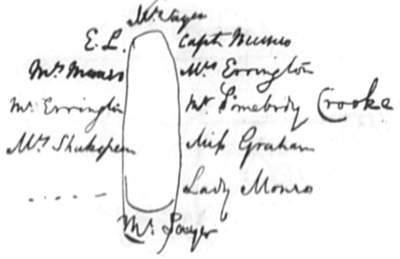Friday, 1 March 1861
Cedars. ―
Dark ― & from 11 to 12.30 pouring rain. ―― Worked little ― being unhinged.
Came Miss Head, & Mrs. & Miss Verey.
After they had gone ― (ἐυτυχῶς!)1 Lord Stanley, who staid an hour. He was very nice & pleasant ― & animated: but towards the close of the visit, was abstrait. I was much pleased to find he had been to Sheen & had seen Penrhyn. ―
Later, ― queer & maniacal ― came good old Sir T. Acland. His visit was rather painful than otherwise as he is greatly aged, & the youthfulness of his character, tho’ natural, appears affected. ― But he is a good man, & liberal & charitable to a wide degree.
Rain & darkness & no work: ― it is indeed folly to talk of work here. ― At 5:30 came J. Gould ―― hardly altered ― kindly & coarse. I said I would dine with him on Monday ― & see “the girls, just as they are.” ― & I prevented the description of that case or phase, as he lingered on the stairs. J.G. is a fine plain specimen of downright perseverance & intelligence.
Did not go out. At 7 to Mr. Sayer’s ― large noisy party.

My next neighbour, Mr. Monro is a Tasmanian, & knew the Denisons well, both in V. Diemensland2 & Sidney. Mrs. M. is a most Ladylike & pleasing woman. But Lady Monro distracted me with noise: & altogether the party was oppressive. Concerning Miss Dixons ― διὰ3 Mrs. Gladstone [stabilita]4 in Downing Street. ― Mrs. Shakespear does not return to Corfû. ――
XX
[Transcribed by Marco Graziosi from Houghton Library, Harvard University, MS Eng. 797.3.]

oh dear! Lear doesn’t seem to have enjoyed his evening with my family: Mrs Shakespear, my great great grandmother, Mr & Mrs Sayer her parents and Mr & Mrs Errington, (either the parents of Mrs Sayer, née Errington, or her brother and his wife). Mr Somebody Crooke may be the brother of Mrs Errington.